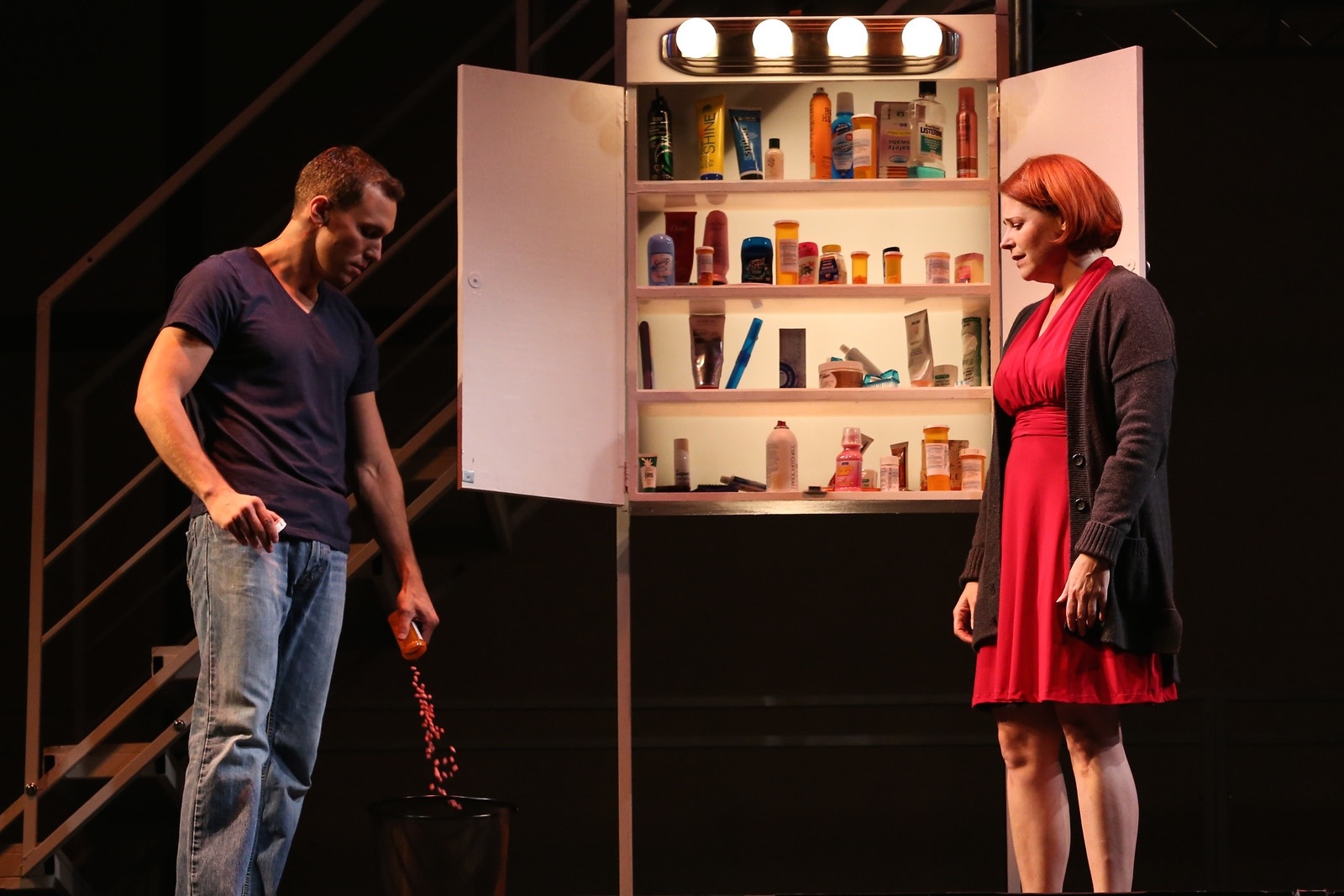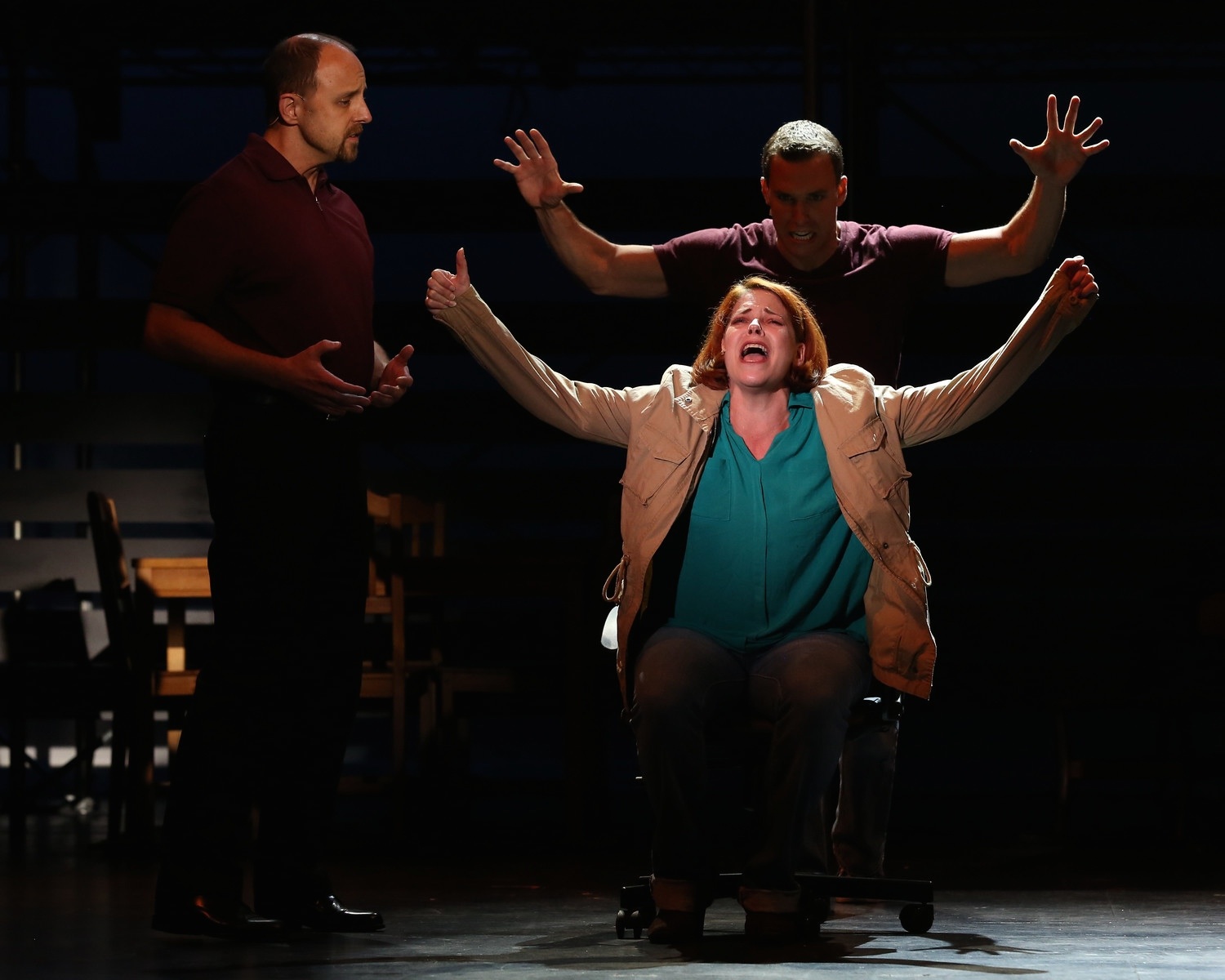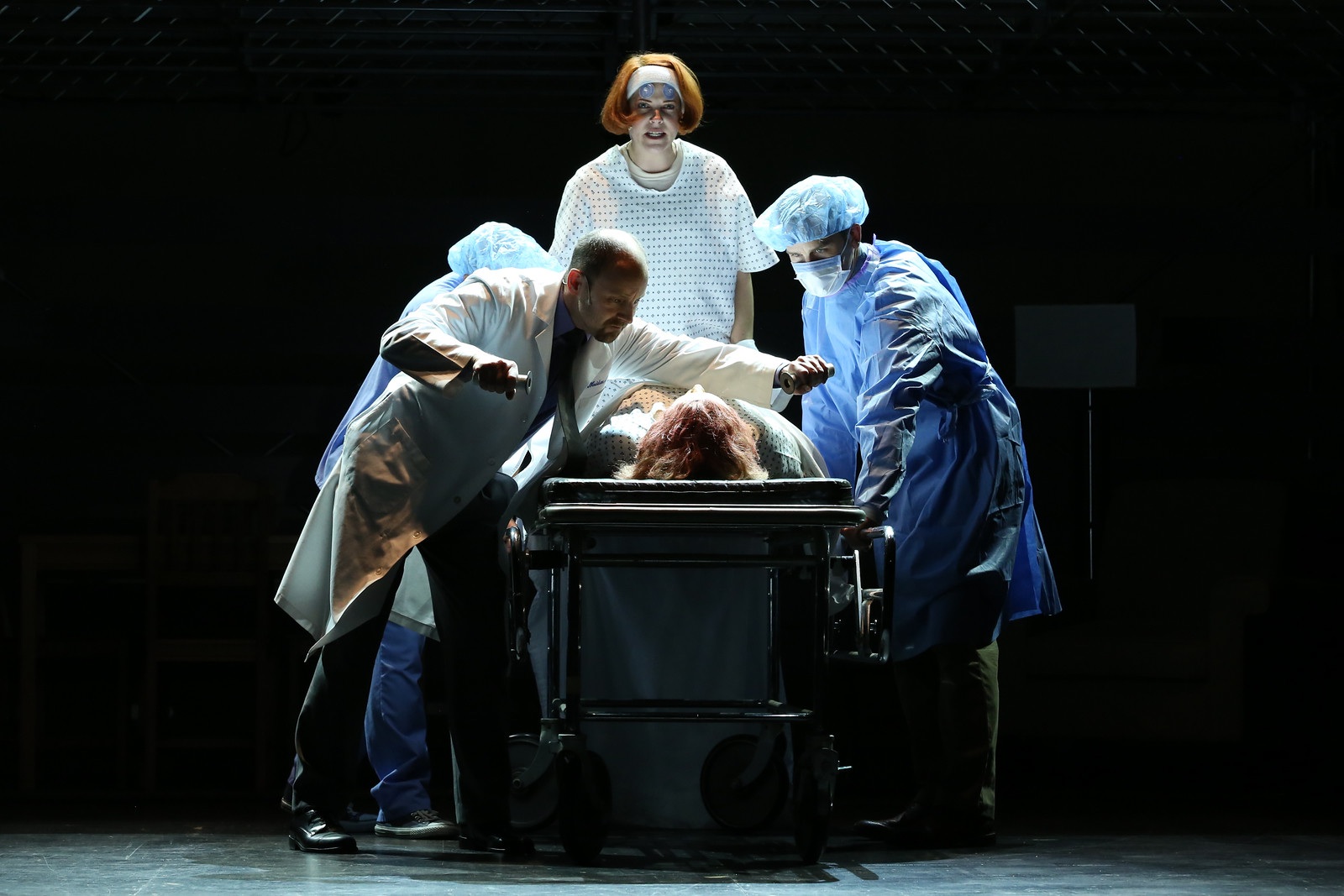For the longest time mental illness was considered a taboo, in many cultures it is something that is not discussed or accepted, leaving the people that are most in need of support and compassion to be alone and ashamed of their condition. Traditionally the media, including news, films, plays, and books have portrayed people with mental illness as villains, adding to the already existing stigma. And at a time when we are just starting to understand where some mental disorders come from and how we might be able to treat or attenuate them, a production like “Next to Normal” serves as a wonderful tool for giving us the insight into one of the most misunderstood diagnoses – Bipolar Disorder.
WARNING: CONTAINS SPOILERS
Synopsis:
The play opens with Diana Goodman (played by Bets Malone) waiting up for her teenage son, Gabe (played by Eddie Egan), to come home, explaining to him once he comes home that she worries about all the unrealistic reasons of how he might have gotten injured or killed. Assuring her that he’s just fine, Gabe runs upstairs as Diana’s teenage daughter, Natalie (Lindsay Joan), enters the kitchen. Natalie is clearly under a lot of pressure and seems to be jittery from all the Red Bull that she was chugging. Diana’s preference for her son is made clear by her at times harsh and impatient remarks toward her daughter: Natalie asks if her parents are going to attend her recital, which clearly means a lot to her, and Diana’s ignoring her daughter’s feelings, seeming not to care about her daughter’s event.
That morning when Diana is helping her husband, Dan (Robert J. Townsend), and her children get ready for work/school, it first becomes apparent that something is wrong, as Diana drops the food on the floor and continues to make sandwiches on the floor surface in an apparent manic state. Dan then brings Diana to the doctor, Mr. Fine (Geno Carr), a psychopharmacologist. Mr. Fine adjusts her medications and she continues to see him in therapy, as her husband struggles with his own feelings of hopelessness about the situation. Diana’s symptoms change with the medication and after a while she says that she feels nothing at all. Mr. Fine considering this to be a success, states that she is now stable. Diana, on the other hand, does not seem to like the numbing effects of her new medication, and, as many patients with Bipolar Disorder do, misses her highs (“I miss the mountains”) and even the deep cut of the lows. With the support of her son, she throws out her medication.

In the meantime, Natalie meets Henry (Eric Michael Parker), another teenager from her school, who is a bit of a stoner, and seems extremely interested in her. As the two begin dating, Natalie appears uncomfortable with Henry’s pot smoking habits. At this point Henry makes her a promise (in a song “Perfect for you”) that he is going to be just the guy she needs. Henry is eventually invited for dinner by the Goodmans.
The tables are set for 4, there are 4 chairs, 4 plates, yet there should have been 5 people: Dan, Diana, Gabe, Natalie, and Henry. Diana brings out a cake for Gabe as it appears to be his birthday, and this is when we learn the heartbreaking truth: Gabe has been dead for over 16 years, he died as a child before Natalie was even born. Dan attempts to convince Diana that “He’s not here,” and tries to convince her to trust him as he’s been here with her all these years (“I’m the one”). However, her hallucination of their son appears again and convinces Diana to trust him over her husband.
Diana begins her work with a psychologist, Dr. Madden (also, Geno Carr), who attempts to get Diana to process her grief and let go of her hallucination. However, at this moment the hallucination of Gabe shows up again, trying to assert that “I’m Alive.”

After a few sessions of struggle, Diana’s therapist convinces her that it is time to let go of her son. However, the task appears to be easier said than done and Diana ends up slashing her wrists in a desperate attempt to be reunited with her son. She is however, rescued, and is then administered two weeks of ECT (electro-convulsive therapy), which is used in the most extreme cases to help patients reduce depression and psychotic tendencies, including hallucinations.

After receiving multiple doses of ECT, Diana appears to have lost a lot of her memory, initially even forgetting her children. This amount of memory loss is not typical and Doctor Madden even remarks on how rare it is to have a patient experience so much amnesia after ECT.
Meanwhile, Natalie, struggling with her own apparent depression, begins taking and abusing her mother’s prescription pills. Henry, concerned about her, tries to reason with her, which leads to a fight. Henry tries to smooth things over the next day by asking Natalie to the dance but things do not look promising.
Dan is happy to have his wife back and becomes extremely protective of any information relating to Gabe as he is scared of retriggering her. He tries to only remind her of the happy memories, going against Dr. Madden’s advice, who had recommended that Dan slowly bring up the subject of Gabe’s death. Diana, who struggles to remember something important, goes back to Dr. Madden, who accidentally mentions her son. Diana’s memories soon return and she is traumatized once more, leading to a big blowout, witnessed by Natalie and Henry. The two women simultaneously sing “Why stay” asking their significant others why they stay in a relationship that appears to be hopeless, while the men remind them of “A Promise” they made “to stay and stay true.”
Diana goes back to Dr. Madden for advice on how she can get better since medicine does not seem to be working. Dr. Madden suggests more ECT, however, Diana suggests that it is not her brain but rather her soul that is broken by her tremendous loss, recalling one of her previous therapists, who suggested that according to the DSM (the manual that therapists use to diagnose their patients), she would appear to have a mental disorder if she continued to grieve the death of her son after 4 months.
As Diana refuses additional treatment, she for the first time has a heart to heart with her daughter. Realizing that she has not been there for Natalie, Diana asks Natalie about her relationship with Henry and apologizes for not being “normal.” Natalie states that she doesn’t expect “normal” but that maybe “Next to Normal” is ok. Diana encourages Natalie to go to the school dance to spend time with Henry.
Diana later walks out on Dan because she seems to need to figure this out on her own. She leaves to go live with her parents for a while, yet, strangely, her son’s hallucination does not follow her but remains behind. As grief stricken Dan tries to understand how his wife could have left him since he stood by her all these years, he sees Gabriel for the first time and for the first time he does not turn away, acknowledging rather than denying the space that the memory of his son takes up.
At the end of the show, Dan goes to see Dr. Madden, asking about how Diana is. Dr. Madden does not directly answer Dan’s question but offers to refer him to another therapist. Dan initially refuses but then agrees, which is a big step for him.
Review:
Next to Normal is a Pulitzer Prize and Tony Award winning musical, being only the 8th musical to win the Pulitzer for Drama (Rent being the 7th).
I recently had the chance to watch this play at the San Diego Musical Theatre:
Cast:
Diana: Bets Malone
Dan: Robert J. Townsend
Natalie: Lindsay Joan
Gabe: Eddie Egan
Henry: Eric Michael Parker
Dr. Madden/Mr. Fine: Geno Carr
All I can say is that if you live in the San Diego area you must see this show. There was not a false step or a wrong move, the entire play flowed seamlessly. There was not a dry eye in the audience, nor did the tears stop rolling. Bets Malone captured the very essence of someone with a bipolar disorder undergoing traumatic grief. My heart broke when she stated that it isn’t her brain but rather her soul that’s broken. Malone depicted the very agony familiar to those who have lost someone dear to them, as well as a familiar struggle that many of us can relate to – when we experience something other people do not understand. Carr had the difficult role of playing a sympathetic yet practical doctor (while at times, also a Rock-Star hallucination), who has the very difficult job of explaining to Diana and the rest of her family what her options are and what’s common and what isn’t.
Throughout the play, each character demonstrated complexity and deep psychological struggles. Lindsay Joan, who played Natalie, depicted a full range of emotion, alternating between anxiety, anger, fear, deep hurt, as well as love and compassion. Both women were absolutely brilliant performing “Why Stay,” while Townsend and Parker gave us hope in humanity with their heartwarming “A Promise.” Both Townsend and Parker made me tear up on multiple occasions with their loyalty and support of their significant others.
The song I couldn’t get out of my head after the show was Egan’s “I”m alive.” Egan’s depiction of Gabe was nothing short of spectacular. Egan’s villainous portrayal of Diana’s hallucination was truly remarkable.
Psychological themes:
Overall, the show did a spectacular job of portraying mental illness and the toll that it might have on the family if left untreated for so many years. It seems that the entire Goodman family struggled with acceptance but in very different ways. Diana, of course, could not bear the loss of her child and thus was trying to keep him alive through her hallucination. She did not have the coping skills that she needed to help her overcome this awful tragedy, nor did she want to let this hallucination go. Her husband and daughter too struggled with acceptance, in their case, of Diana’s condition. What we saw on stage, in particular in the relationship between Diana and Natalie, was something referred to as high Expressed Emotion (EE), which refers to the negatively expressed emotions that are expressed toward or around people with mental illness. EE has been shown to increase one’s vulnerability for relapses in depressive or psychotic episodes.
Diana’s therapist implements hypnotherapy with her, and works to help her let go of her hallucination. Not every therapy session would look like that, though some would. In my work with grief, depression, and posttraumatic stress disorder (PTSD), I help my clients slowly and safely experience their grief while working toward things that are most important to them. For example, if Diana were to be my patient, I would have probably focused on working on her relationship with her daughter and husband. Occasionally, taking away the patient’s coping mechanisms (and Diana hallucinating that Gabe was still alive was exactly that – a coping mechanism), without giving him or her the proper coping skills to replace the maladaptive skills, can be dangerous as the patient is more likely to relapse without proper support or tools. For example, when treating a patient with substance abuse, it would not be extremely beneficial to only advise the patient to give up the substance without giving him or her some assistance in reducing cravings, as well as the anxiety, depression, and shame that are often present when someone is in withdrawal.
Under the pressure of taking care of Diana, both Dan and Natalie are struggling, though in different ways. Dan appears to be going through some symptoms of depression, while Natalie begins to act out and abuse prescription drugs. Often after people spend a lot of time and effort taking care of someone else, especially a family member, they might begin to experience fatigue, frustration, depression, or anger toward the person that they were taking care of. This is called Caretaker Burnout. Although Natalie was not the main caretaker for Diana, she nevertheless felt responsible for her mother’s well-being, which can sometimes be a lot for a child, causing her to become resentful and bitter. The most effective way of reducing caretaker burnout and increasing one’s resilience is through self-compassion. Self-compassion refers to treating ourselves with kindness when we are suffering, the same kind of kindness that we would use with our children, other loved ones, or pets when they are going through a hard time. Think of the announcement we hear on the airplane of putting on our own mask first before assisting others. This is a difficult and an important thing to keep in mind – if we do not take care of ourselves, it will be very difficult, if not impossible for us to take care of others.
Next to Normal does an amazing job of providing education about mental illness and inspiring compassion and empathy in our hearts. If you can, go see this amazing play.

I thought everything was put together well. i also thought that all Bases were covered as far as mental illness .
I saw a different production of this, and agree on all counts except one – at the end, I don’t think Dan was seeing Gabe “for the first time”. I got the impression that Dan had been seeing Gabe throughout the entire play, and was simply in denial. I felt like Gabe’s presence as Diana’s hallucination was secondary to his presence as a ghost in the family, as the scar of loss (hence Diana’s self-diagnosis as being broken “in the soul”), and the ending indicated that part of Dan’s burden was that he was as much in denial as Diana was, only bearing a double-denial of pretending to be normal. At the end, Dan finally acknowledges that he’s Not Okay, and that’s okay. And when Gabe is finally acknowledged and accepted for the ghost he is, he ceases to be harmful or in control.
Thanks so much for your post, Katie. That makes a lot of sense. I hadn’t thought of it that way.
I guess I’ll need to see the play again 🙂